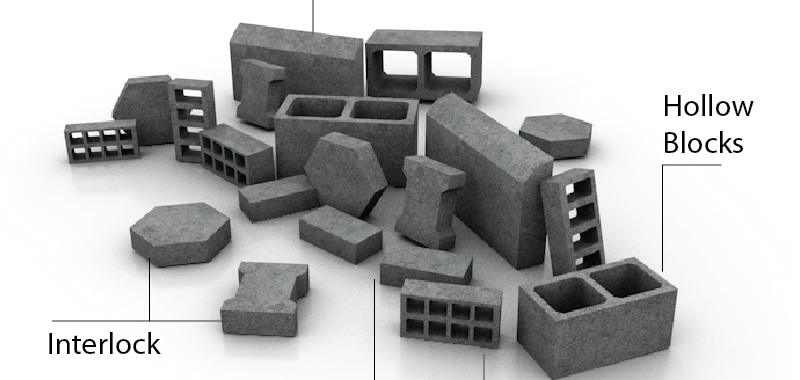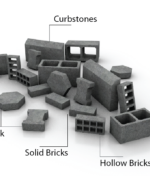
Types of Blocks and Their Uses in Construction and Finishing

Blocks (bricks) are considered one of the essential construction materials that are indispensable in any construction project, whether residential, commercial, or industrial. The types of blocks vary based on the materials used in their production, their uses, load-bearing capacity, and the final shape.
In this article, we review the most common types of blocks in the market, including red bricks, cement blocks, curbstones, interlocking tiles, cement tiles, and hollow blocks, along with their advantages and uses.
1. Red Bricks (Clay Bricks)
Red bricks are made from clay and fired in special kilns. They are one of the oldest and most commonly used types of bricks.
- Advantages: Resistant to moisture and heat – Soundproof – Relatively lightweight.
- Uses: Internal and external walls, especially in hot areas.
2. Cement Blocks (Concrete Blocks)
Cement blocks are made from a mixture of cement, sand, and gravel, and are widely used in foundations and walls.
- Types: Solid and hollow.
- Advantages: High strength – Resistant to environmental factors – Easy to install.
- Uses: Load-bearing walls, external walls, and foundations.
3. Curbstones (Curb Blocks)
Curbstones are concrete pieces used to define roads, pavements, and green areas.
- Advantages: Durable – Pressure resistant – Available in various shapes and colors.
- Uses: Defining pavements and garden paths.
4. Interlocking Tiles
Interlocking tiles are concrete pieces that fit together without mortar and are used for outdoor flooring.
- Advantages: Easy to install and remove – Can withstand heavy loads – Aesthetic appeal.
- Uses: Pathways, villa entrances, and parking lots.
5. Cement Tiles
Cement tiles are used for covering external floors and are available in multiple shapes and colors.
- Advantages: Abrasion-resistant – Slip-resistant – Durable in all weather conditions.
- Uses: Pavements, school yards, and parking lots.
6. Hollow Blocks
Hollow blocks are specialized blocks used for ceilings and can be either concrete or foam-based.
- Types: Concrete hollow blocks and foam-based hollow blocks.
- Advantages: Reduces the amount of concrete used – Sound and heat insulation – Lightweight.
- Uses: Hollow ceilings in residential and commercial buildings.
Ali Dail & Brothers Co. – Block Division
Ali Dail & Brothers Co. is one of the leading companies in the construction materials sector in the region. The company has a dedicated block division that offers a wide range of block types to meet the needs of various projects. The block division includes the following types:
- Red Bricks: Known for their resistance to moisture and heat.
- Cement Blocks: Solid and hollow, offering high load-bearing capacity and ease of installation.
- Curbstones: Used for defining pavements and pathways, available in various colors and designs.
- Interlocking Tiles: Ideal for outdoor flooring, easy to install, and highly durable.
- Cement Tiles: Perfect for covering external floors and defining spaces.
Ali Dail & Brothers Co. strives to provide high-quality products at competitive prices to meet both local and international market needs, adhering to the highest standards of quality and safety in manufacturing and supplying all types of blocks.
Conclusion
Each type of block has its own unique characteristics and uses, making it suitable for specific purposes. From red bricks and cement blocks used in walls, to interlocking tiles and curbstones used for finishing, to hollow blocks for ceilings.
Choosing the right type ensures not only safety but also reduces costs and enhances the overall quality of the building. Therefore, it is always recommended to use high-quality materials from trusted suppliers.




